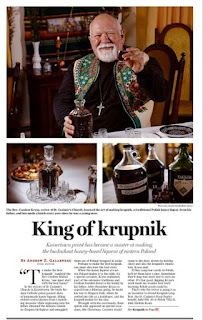Healing, Healthy Caroling: The Season's 40 Days
“His Mother Pondered all these things in
her Heart”
The Origins
Christmas’ 40 Caroling Days Part 1 of 2
Jacek Malczewski’s “Jasełka” or “The Manger” painting in oil splendidly presents the attitude of meditation on this holy mystery.
Why forty days of Christmas caroling? First, the liturgical greeting
on the 40th Day post-Christmas day singularly sets off this season declaring,
“Forty days have passed since we celebrated the joyous feast of the Nativity of
Our Lord.” Second, the Gospel of St Luke with its Old Testament roots, presents
the Presentation of the Lord in the Temple forty days after his birth. This
event ends Jesus’ Infancy Narratives, or series of baby stories.
Thirdly, and most inspiring is Mama Mary’s Gospel-mindfulness
attitude of “pondering all these events in her heart.” Mindful reflection on
divine-encounters creates spiritual strength necessary to bear unsurmountable
challenges, like the execution of a son.
Poland’s traditional caroling season celebrates Jesus’
Nativity songs at home and in church. During these January days, families pilgrimage
to church Manger scenes all throughout continental Europe, the British Isles, in
South America, as well as Christian Asian. The US is an exception to this
Catholic devotional practice. For others, days of joyful Crèche visitation end on what
Hispanics call call Candelaria, Poles—Gromniczna, or Candlemas by the English.
The Procession and Blessing of Thunder Candles on the Feast of the Lord’s
Presentation, Feb 2, completes the carol season.
PolAm caroling tradition is an opportunity to follow Mary’s
example and “ponder in our hearts” the events of Christmas during blistery, frigid,
home-bound days. Winter incites quiet reflection. This is how and why,
throughout my life, I have enjoyed this season. Visiting less familiar kolędy (Polish carols) and patiently singing
through all the verses, we take so little time in church to enjoy, lifts my
soul and heart during the dreary, flu season (Facebook.com/stcasimirbuffalo is featuring a carol for each of the 12 Days of Christmas).
Polish carols tell a story, missed by singing only one or two verses. Singing
also strengthens the immune system.
Finally, Polish carols are globally unique in number, theme,
spirituality, style and story. This two-part series “Forty Days of Caroling”
will skim through a matchless repertoire. St Casimir’s distinctive Heritage
Hymnal, Buffalo, 2015, 2017, (referred to here as HH) is the source for most of the English adaptations of Polish carols considered here. Polish Carols are unique in following ways:
1) Conversational intimacy
At Yankee Stadium a saint spoke of learning from the angels’
caroling command, not to fear to take up Gospel mission, “Arise, O shepherds….
Hasten quickly to the stable” (In Midnight Stillness, HH, n. 6; Shepherds hear the Glory, n 18; Yesterday at
Midnight, n. 24). St John Paul often quoted Polish hymns in his sermons. Second
person discourse continues in “Shepherds dear, O pray! What saw you this day…?
(HH, 20), as well as the
playful carol, "O Joseph," These carols are built on questions with answers.
Little or no explanation is necessary of a child’s mutual
exchange in "O, Little, O Tiny One" (Oj,
Maluśki). The toddler asks the
glove-size Infant, “Why didn’t you stay up there in heaven? You had tons of
toys, cookies and hot chocolate. Here you’ll drink bitter tears. Or maybe your Daddy threw you out?” Each verse
flows into a lilting, reflective refrain.
2) Tear-friendliness
Carolers take on Mama Mary’s voice and vice-versa in "Slumber
on Holy Child" (HH, 8). Trying
to calm His tears was an exchange so tender Frederick Chopin inserted it into his B minor Scherzo. There are many examples of Mary lulling her crying
Infant to sleep. The “Lee, lee, lee, lie,” lullaby refrain of The Lovely Maiden
is among the favored (HH, 17).
3) Not avoiding human suffering
The Baby Jesus cries and “tastes bitter scarcity” in the
words of "In a Manger" (HH, n. 22). Polish Christmas carol spirituality reveals
God not shunning human suffering. The same is true of, “No great place, had
he…but a manger cold and drear” ("Shepherds Heard the Angels," (HH, 19) or “Jesus scorns not our
station…in our sin he tasted guile” ("Earth and Heaven," n. 16).






Comments
Post a Comment